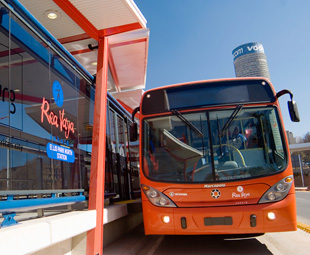Transport budget boost

A three-year capital expenditure project has been put forward that should see the City of Johannesburg excel with some R3 billion allocated to transportation. This massive investment could change the way that we get around in future.
In total the City of Johannesburg has announced a budget of more than R40 billion, with operational expenditure at R36,3 billion and capital expenditure at R7,5 billion. About R4,6 billion of capital expenditure will be funded by the City and R3 billion from grants and public contributions.
Tabling the City’s medium term budget for 2013/14 on Wednesday, 22 May, mayoral committee member for finance, Geoffrey Makhubo, said Johannesburg was the first municipality in the country to table a multi-year capital budget of R30,1 billion.
“From a current average of 39 percent self-funding, we will grow to above 65 percent funding by the City,” he points out.
Key clusters, such as economic growth, were allocated a substantial budget. It received an operating budget of R3 billion and a capital budget of R9,1 billion.
“A further R29,5 million was earmarked for cycling lanes and pavement improvements in the following routes: Kaalfontein Extension eight; Ivory Park; Midrand; the University of Johannesburg and the University of the Witwatersrand,” Makhubo adds.
Johannesburg Roads Agency, which also falls under transportation, was allocated an operating budget of R736 million and a capital budget of R4,5 billion. The latter would be channelled towards the resealing, resurfacing and renewal of roads throughout the city, including; Bryanston, Sandton, Rivonia, Parkview, Eldorado Park and Riverlea. “Projects will also include upgrades of the Naledi/Protea bridge,” says Makhubo.
“Other projects include traffic signal mobility management and the maintenance of roads, bridges and storm water infrastructure,” he points out. “We will upgrade roads in Bram Fischerville, Diepsloot, Doornkop/Thulani, New Lawley, Orange Farm, Tshepisong and Ivory Park.”
Metrobus received an operating budget of R483,1 million and a capital budget of R101,8 million towards the purchase of new buses.
Makhubo says that Johannesburg is a major player in the greater scheme of things when it comes to determining the economic state of the country. Gauteng accounts for 34 percent of the national economy and Johannesburg contributes 48 percent to Gauteng’s economy. “This implies that a growth in the economy of Johannesburg will significantly affect the national and provincial economies on average,” he says.
Published by
Focus on Transport
focusmagsa




